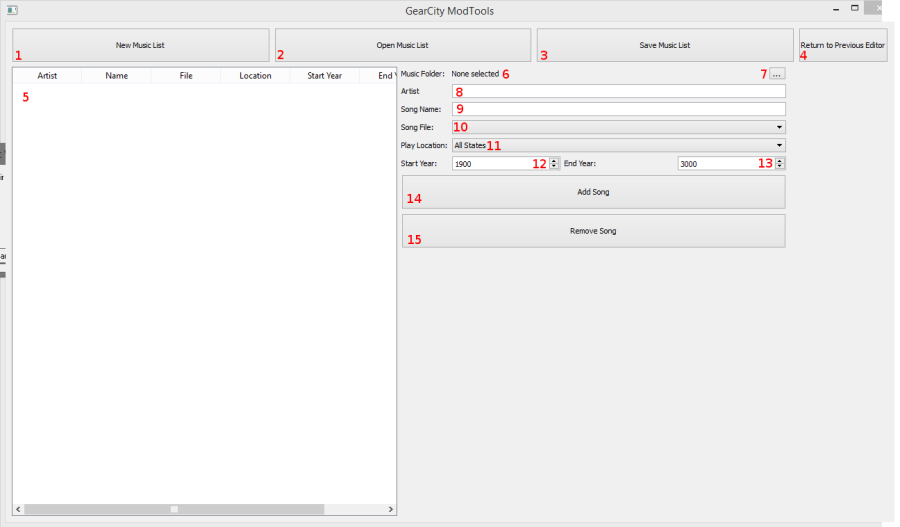
#' names a vector of the same length as 'x' with the names to be plotted below the lollipops. I know ‘ ggplot2‘ produces great lollipop charts already, but I like to keep my package dependencies to a minimum, or else they become much harder to maintain… So here’s the new function: #' Title Lollipop chart So, in the next versions of the ‘ modEvA‘ and ‘ fuzzySim‘ packages, functions that produce bar plots will instead (by default) produce lollipop charts, using the new ‘lollipop’ function which will be included in ‘ modEvA‘.
#Modtools mutch update
So you’ll also get a figure like this, with the selected presences in blue and the excluded ones in red:įeedback welcome before I update the package on CRAN! Posted in modTools | Leave a reply Lollipop chartĪccording to modern recommendations in data viz, lollipop charts are generally a better alternative to bar charts, as they reduce the visual distortion caused by the length of the bars, making it easier to compare the values. As I always like my students to look at the results of every step of the analysis before moving on, I added a plot argument which is TRUE by default. Run help(cleanCoords) to see the arguments that you can turn on or off. # 462 rows after 'rm.uncert' (with uncert.limit=10000 and uncert.na.pass=TRUE) Occ_clean <- fuzzySim::cleanCoords(occ, ls = c("decimalLongitude", "decimalLatitude"), l = "coordinateUncertaintyInMeters", uncert.limit = 10000) # 10 km tolerance Occ <- geodata::sp_occurrence(genus = "Orycteropus", species = "afer", fixnames = FALSE)
#Modtools mutch download
# download some species occurrences from GBIF: Here’s a usage example, which currently involves installing the latest development version of fuzzySim from R-Forge, and also the geodata package for downloading some GBIF records to clean: install.packages("fuzzySim", repos="") This function removes (any or all of) duplicate, missing, impossible, unlikely, imprecise or overly uncertain spatial coordinates.

As I need students to have at least most of the worst data errors cleaned before modelling, but can’t spend much of their time and attention on something that’s not the main focus of the course, scrubr was my go-to option… until it was archived, both on CRAN and on GitHub! While I always advise students to do a more thorough data inspection for real work after the course, I implemented those no-fuss, safe-and-simple essential cleaning procedures in a new cleanCoords function in package fuzzySim. near region centroids or towns or institutions, or wrongly considered outliers) if their argument values are not mindfully tailored and their results not carefully inspected. CoordinateCleaner, biogeo, or the GUI-based bdclean), but they either require (somewhat laborious) data formatting, and/or they can eliminate many valid records (e.g. There are other R packages for species occurrence data cleaning (e.g. In my species distribution modelling courses, for a quick and safe removal of the most common biodiversity database errors, I’ve so far used functions from the scrubr R package, namely ‘coord_incomplete’, ‘coord_impossible’, ‘coord_unlikely’, ‘coord_imprecise’ and ‘coord_uncertain’. Thanks are due to Arpat Ozgul and François Guilhaumon, who helped me through the steep part of the R learning curve (to me it was actually more like an overhang). Comments and suggestions are very welcome, although a quick response cannot be guaranteed! Leave a comment here if you use these functions in publications - this way I can cite you in the blog, track how people are using the tools, and justify the time and effort dedicated to them. P lease note that these tools are experimental (like R, they come with absolutely no warranty) and occasionally edited with corrections or improvements, so preferably check back for the latest version before you use a function.

Most of them are now being included in R packages - please cite the appropriate package (mentioned in the blog post featuring each function) if you use these tools, which are released under a Creative Commons Attribution license.
#Modtools mutch software
This website provides a series of free software tools, mostly written in R, that can be used for various tasks related to the analysis of species’ distribution and ecology (although many of them can be applied to other purposes).


 0 kommentar(er)
0 kommentar(er)
